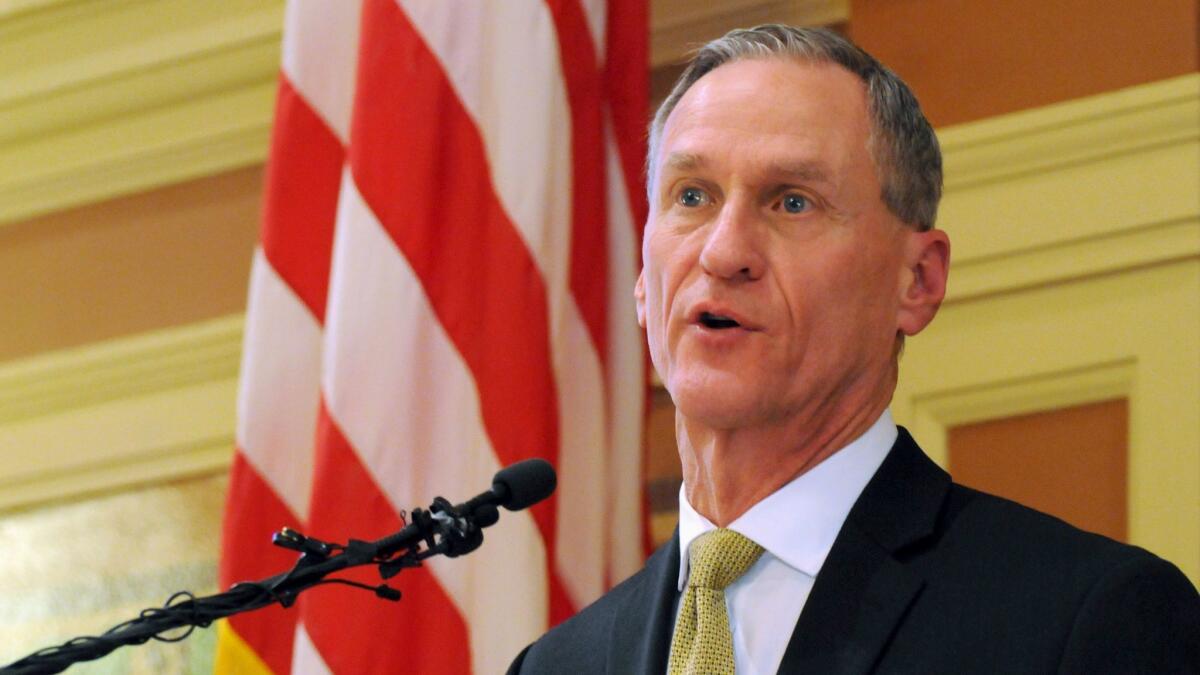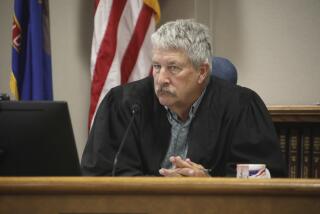South Dakota governor vetoes bills trying to loosen gun laws

Itâs not something you see every day: a Republican governor in a Republican-dominated state vetoing a Republican-backed gun bill.
Thatâs what happened in South Dakota on Friday, as Gov. Dennis Daugaard followed through with his threats to veto a pair of bills that would have loosened the stateâs gun laws.
House Bill 1156 would have allowed people to bring concealed handguns into the state Capitol. House Bill 1072, the broader of the two measures, would have removed the requirement for concealed-carry permits. Neither bill passed with a wide enough majority to overcome the governorâs veto.
Daugaard said the stateâs existing concealed-permit law, which includes a $10 fee and background check, is fine as it is, and he flashed his conservative credentials to defend his decision.
In his veto letter to lawmakers, Daugaard said he was a member of the National Rifle Assn. and quoted former U.S. Supreme Court Justice Antonin Scalia, a conservative firebrand, as saying that the 2nd Amendment right to bear arms was ânot unlimited.â
âI am unaware of a single instance in which a person who could lawfully possess a gun was denied a permit to carry a concealed pistol,â Daugaard wrote lawmakers. âOur permit laws are effective in screening people who are not eligible to carry a concealed weapon.
âOver the last three years, Minnehaha and Pennington Counties have turned down nearly 600 permit applicants who were disqualified due to mental illness or due to violent or drug-related crimes.â
Daugaardâs veto came as gun rights groups and legislators across the country continue to weaken laws governing firearms. In Texas, for example, laws passed in recent years mandate fewer requirements to openly carry firearms and allow people to carry more broadly on college campuses. Other states have similar laws.
The concealed-carry bill pitted the NRA, which was in support of passage, against state law-enforcement groups in opposition, including the South Dakota Sheriffsâ Assn., the South Dakota Police Chiefsâ Assn., the South Dakota Stateâs Attorneys Assn. and the South Dakota Fraternal Order of Police.
âThis important pro-self-defense legislation is a big step forward in allowing South Dakotans to be better able to defend themselves and their loved ones without having to obtain a government issued permit,â the NRAâs lobbying wing had written earlier this month, calling for gun owners to contact Daugaard to urge him to sign the bill.
The group said that under current law, putting on a coat while carrying a gun could mean that the wearer would need a concealed-carry permit. âThis legislation gives South Dakotans the freedom to choose the best method of carrying for them, based on their attire, gender and/or physical attributes,â the group wrote.
Last week, the billâs backers had delivered a stack of 2,000 letters to Daugaardâs office calling for him to sign the bill. They included Republican state Rep. Lynne DiSanto, who blasted Daugaardâs decision Friday.
âHe has commented that heâs not going to be running for higher political office, which is good cause he couldnât win DOG CATCHER anywhere in SD,â DiSanto wrote in a Facebook post. âWe have a super majority of Repubs in Pierre, so a veto override should be easy right? NO, because some of the âRâsâ donât know what that means, choosing to raise taxes higher and take away your gun rights.â
The stateâs Senate passed the concealed-carry bill 23 to 11, but it passed the House of Representatives only 37 to 30, meaning that the billâs backers canât muster the two-thirds majority required to override the veto.
The bill to allow guns in the statehouse passed the House of Representatives 46 to 20, but had a closer margin in the Senate, passing 19 to 15.
Daugaard has not been afraid to wield his veto power. The two gun bills were among several that he vetoed Friday on a variety of issues.
In 2016, he gained national notice for vetoing a bill that would have made South Dakota the first state in the country to require transgender students to use bathrooms and locker rooms that match the gender listed on their birth certificates. That distinction instead fell to North Carolina, whose House Bill 2 led to months of boycotts, protests and litigation that continue to roil the Southern state.
âAs policymakers in South Dakota, we often recite that the best government is the government closest to the people,â Daugaard wrote in his veto notice last year. âLocal school districts can, and have, made necessary restroom and locker room accommodations that serve the best interests of all students, regardless of biological sex or gender identity.â
UPDATES:
2:25 p.m.: This article was updated with Times staff reporting.
This article was originally published at 12:45 p.m.
More to Read
Sign up for Essential California
The most important California stories and recommendations in your inbox every morning.
You may occasionally receive promotional content from the Los Angeles Times.











